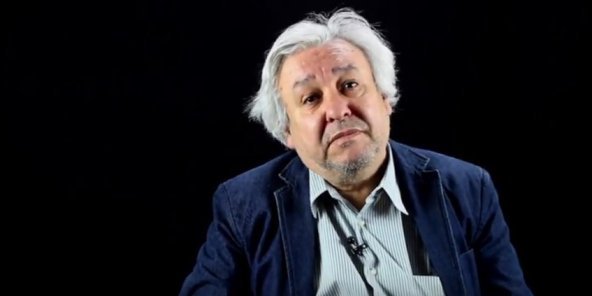Lebanon salutes the memory of Algerian director Farouk Beloufa for his film "Nahla"
hello!
Thanks for stoping by:)
I hope you have enjoyed my previous post and are excited for thiss one , which i can assure you wil be more interesting and more fun.
The Lebanese press hailed the memory of the Algerian filmmaker Farouk Beloufa, who disappeared on April 9 and whose "Nahla", a fiction film shot during the Lebanese civil war, is considered as the testimony of an era.

Farouk Beloufa, the director of "Nahla", died on April 9 in France. © Screenshot YouTube Screen / Marengo Hadjout
Two events that, a priori, do not have so much to do with each other, have nevertheless been telescoped. On the one hand, the announcement of the release in May of Operation Beirut ("Beirut" in English), superproduction of American espionage, and on the other, the news, this April 9, of the death of the discreet director Algerian Farouk Beloufa at the age of 71 in Paris. The latter is the author of a classic Algerian cinema, Nahla, released in 1979 and whose plot takes place, such as Operation Beirut, during the civil war in Lebanon. The press and the Lebanese netizens were not tender with the American film but saluted the memory of the Algerian filmmaker. The reason: the way to film the Lebanese capital and the war that hit it for years.
A fed up
As reported by the New York Times, Operation Beirut, even before its theatrical release, is already sparking rejection and mistrust in the Middle East, where Hashtag #BoycottBeirutMovie appeared. Newspapers with very different editorial lines have pointed out the rudeness of the film and the Lebanese Minister of Culture, Ghattas Khoury, has accused, as reported by L'Orient Le Jour: "when an author or director wants to make a film, he document the place and the story so that the film is truthful [...]. Our glorious city has been unfairly disfigured ... "
The trailer promises indeed a film to the nerdy soundtrack and orientalist, shot not in Lebanon, but in Morocco - like many fictions supposed to take place in the vast "Arab world" - and the cast leaving only an incongruous place to the Lebanese actors. The pitch, which is available on Warner Bros, the French broadcaster, promises the worst. The paternalistic symbolism is assumed: the hero is an American who seeks to adopt a "Lebanese orphan". The hero, a diplomat, is called to be a negotiator in a war-torn Beirut, between CIA services, Israeli services and "terrorists", grotesque figures who have become recurrent in contemporary film production.
The fed up with easy American scenarios is not new. In 2015, street artists tagged the messages "Homeland is racist" during the filming of the American series "Homeland", also largely focused on the issue of security and terrorism. The messages were written in Arabic on the streets where the actors of the series were walking, supposed to be a Syrian refugee camp.
Nahla, a subtle film
Although the Lebanese press has wracked Operation Beirut, it has largely applauded the director Farouk Beloufa, many journalists are familiar Nahla, shot in 1978 when fighting began in Beirut, was co-written with Algerian intellectual Rashid Boudjedra.
"In Nahla, no "terrorists" as in Operation Beirut
We are in 1975, and Larbi, young Algerian journalist, covers the events that announce the civil war in the wake of the Israeli incursion in January in Arkoub. He is close to Nahla, a singer who is on the way to becoming a myth in the entire Arabic-speaking world and whose friends include Maha, a feminist journalist and Hind, a Palestinian activist. Here, no "terrorists" like in Operation Beirut.In addition to a passionate love as a common thread, the old dream of Arab unity, the struggle of the Palestinian people, the feminist struggle, are all topics that cross Nahla and all are approached with a real subtlety.
At the center of the film lies the aspiration of youth to become emancipated as individuals, and especially as a woman, as a collective group, as Arab people. A memory of the violent Lebanese events that does not hide the violence of the time, but radically the antithesis of Manichaeism and the caricature out of context that seems to offer Operation Beirut.
The film is worn by a superb soundtrack, the work of Ziad Rahbani, eldest son of Lebanese singer Fairuz, a famous Lebanese Communist Party roadmate and successful composer.
A symbolic journey
Farouk Beloufa's career is emblematic of the wealth of contemporary Maghreb and Middle Eastern cinema. Beloufa, of which Nahla is the only feature film outside of Insurrectionale, a militant film censored by Algiers and edited to be presented without a signature, was notably a student of Roland Barthes in Paris and assistant to the Egyptian director Youssef Chahine on The Return of prodigal child. The influence of Arab cinema is a subject that continues to interest,, as evidenced by the release of My story is not yet written, documentary on the cinematheque of Algiers.
Nahla's memory remained alive. According to the association Digital Archives of Algerian Cinema, which has put a French subtitled version of Nahla online, "in 2013, Algerian filmmaker Tariq Teguia paid tribute, in his film Revolution Zendj, to Farouk Beloufa by naming his heroine , young Palestinian woman looking for traces of her father in Beirut, Nahla ». In Lebanon, journalist Pierre Abi-Saab praised the memory of the author of a film "of historical importance" in the newspaper Al Akhbar.